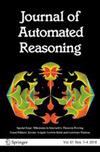统一分裂。
IF 0.9
3区 计算机科学
Q4 COMPUTER SCIENCE, ARTIFICIAL INTELLIGENCE
引用次数: 1
摘要
AVATAR是一种优雅而有效的方法,可以使用SAT求解器拆分饱和证明中的子句。但它在反驳上完整吗?它与其他拆分架构有什么关系?为了回答这些问题,我们提出了一个统一的框架,该框架扩展了具有分裂的饱和演算(例如,叠加),并将结果嵌入到由SAT求解器引导的证明器中。该框架还允许我们研究锁定,这是一种基于当前命题模型的包含式机制。各种体系结构都是框架的实例,包括AVATAR、标记分割和带有量词的SMT。本文章由计算机程序翻译,如有差异,请以英文原文为准。

Unifying Splitting.
AVATAR is an elegant and effective way to split clauses in a saturation prover using a SAT solver. But is it refutationally complete? And how does it relate to other splitting architectures? To answer these questions, we present a unifying framework that extends a saturation calculus (e.g., superposition) with splitting and that embeds the result in a prover guided by a SAT solver. The framework also allows us to study locking, a subsumption-like mechanism based on the current propositional model. Various architectures are instances of the framework, including AVATAR, labeled splitting, and SMT with quantifiers.
求助全文
通过发布文献求助,成功后即可免费获取论文全文。
去求助
来源期刊

Journal of Automated Reasoning
工程技术-计算机:人工智能
CiteScore
3.60
自引率
9.10%
发文量
31
审稿时长
>12 weeks
期刊介绍:
The Journal of Automated Reasoning is an interdisciplinary journal that maintains a balance between theory, implementation and application. The spectrum of material published ranges from the presentation of a new inference rule with proof of its logical properties to a detailed account of a computer program designed to solve various problems in industry. The main fields covered are automated theorem proving, logic programming, expert systems, program synthesis and validation, artificial intelligence, computational logic, robotics, and various industrial applications. The papers share the common feature of focusing on several aspects of automated reasoning, a field whose objective is the design and implementation of a computer program that serves as an assistant in solving problems and in answering questions that require reasoning.
The Journal of Automated Reasoning provides a forum and a means for exchanging information for those interested purely in theory, those interested primarily in implementation, and those interested in specific research and industrial applications.
 求助内容:
求助内容: 应助结果提醒方式:
应助结果提醒方式:


